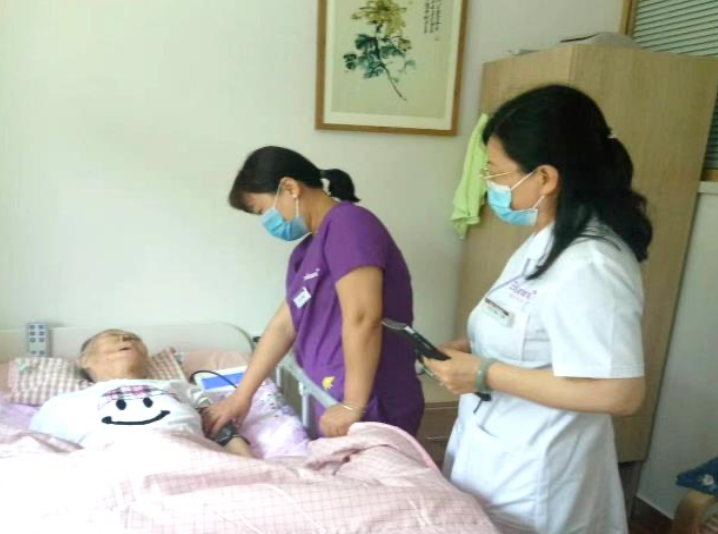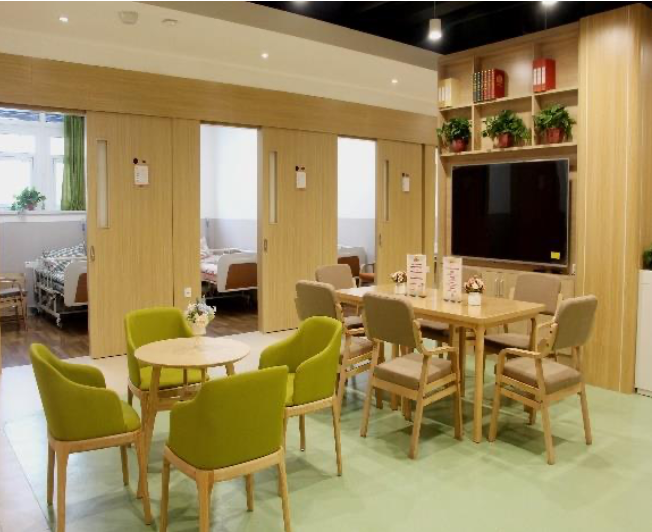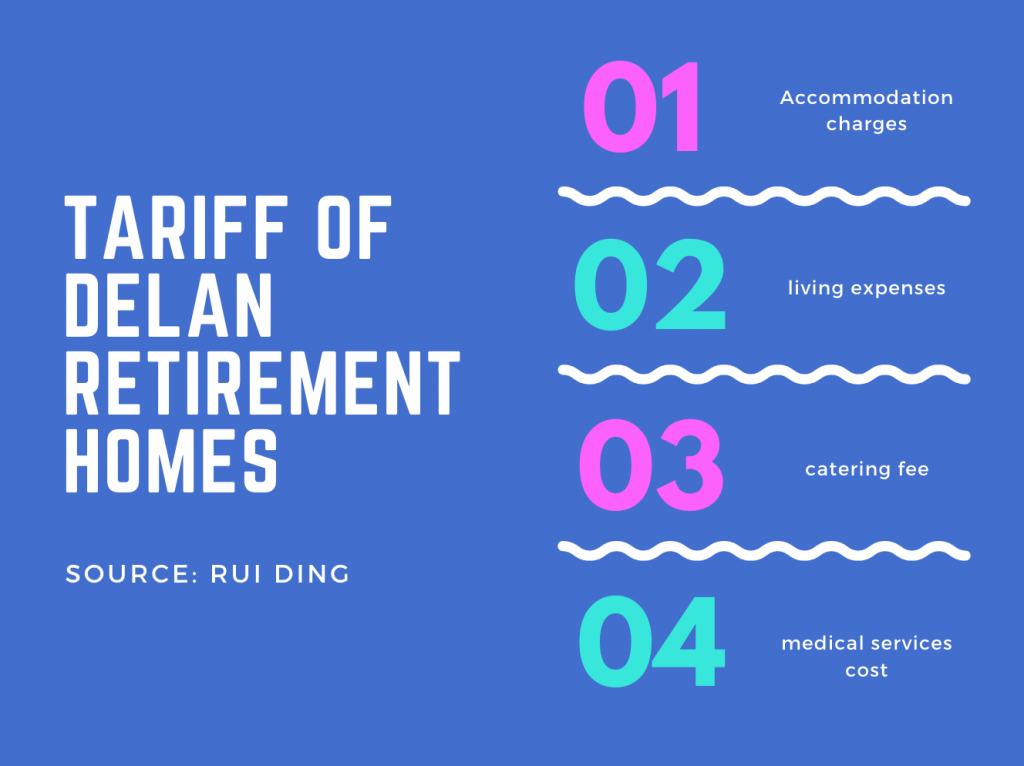While China is facing a tough ageing demographic, more and more people have to think about their retirement lives. With integrated retirement homes becoming increasingly popular in recent years in China, how does the integrated elderly social care policy affect old people living in the North East area?
As people gradually emerge from the shadow of the February pandemic in Wuhan back to normal life, an old lady from Korean ethnic group in China was brought in by her family to the Delan Retirement Home (Quan Yun Village branch) on 3 June 2020. As a part of her personal belongings, there were a number of special items prepared by her family for her – her funeral suit, which possibly meant that their children had completely lost hope for her.
At the age of 77, suffering from the sequelae of brain-vascular disease and completely loss of speech and mobility, this nanny became the first elderly person in the records to be admitted to the Delan Retirement Home (Quan Yun Village branch) during the pandemic.
Unlike vegetative patients, this grandmother can still feel pain, despite losing many physical indicators. She makes sounds and rolls her eyes when she feels discomfort, and can respond vaguely to caregivers who call her name.
Both her son and daughter were too far away in South Korea to accompany her on her final journey. Because of the reputation of the Delan retirement homes, they made the effort to send the her here after a recommendation from a friend of them. They hoped that their mother would be able to spend the last period of her life in a peaceful environment with as much dignity as possible.
More than a year has passed since she moved in Delan Retirement home, and although the elderly woman is still faintly conscious, has a catheter and a nasal feeding tube and can only respond very weakly to pain, it has been a great and unexpected situation for her children to discover that their mother is still alive.
“They didn’t expect us to take care of their mom so well, either,” Zheng Ge, the new director of Delan Retirement Home (Quan Yun Village branch) ,says, “The reason why they chose us at that time was because we are able to offer an integrated elderly social care. “

With the availability of medical grade services and the support of Delan Hospitals, Delan Retirement Homes in Liaoning Province have attracted many elderly people with high clinical demands. Retirement homes like Delan are more like a presence between a traditional care-only retirement home and a hospital, taking on many elderly people who have received medical treatment but have not returned to normal living patterns.
One of the owner of Delan Medical Healthcare Group, Rui Ding, says that some elderly people who are suffering from a chronic sickness are sent to Delan retirement home because their children feel bothered to look after them every single day for plenty of year.
“There are more medical institutions in any one place, but when it comes to rehabilitation medical institutions, the number is small, and the proportion of rehabilitation beds in large hospitals to hospital beds is also relatively low.” Dachuan Li, director of the Medical and Nursing Division of the National Health and Family Planning Commission’s Medical Administration, says on the workshop on Capacity Building for Health Care Integration and Promotion of Standardized Capacity Building hosted by the Capacity Building and Continuing Education Centre of the National Health and Family Planning Commission.
And the idea to start such a new type of integrated retirement home did not come from the brainstorming of one person or a few founders, but from one of the Chinese government’s policies for the elderly to solve the people’s retirement problems, integrated elderly social care policy, in 2016.
According to the official website of the Chinese Ministry of Civil Affairs, the policy of integrating medical and health care is to integrate medical and health care resources into elderly care institutions, communities and residents’ homes, which are currently the three more mainstream elderly care environments in China.
On the policy briefing of The Information Office of the State Council in 2019, the Director General of the Department of Ageing, National Health and Wellness Commission stated some expected outcome of integrated elderly social care policy. “On the one hand, it allows many elderly hospitalized people to leave the hospital of their own accord, reducing the pressure on hospital beds, which in itself saves a lot of money in health insurance,” Haidong Wang said, “and on the other hand, it reduces the vacancy rate of elderly institutions through the development of integrated health care, which is a win-win situation. “
Rui Ding and her investment partners initially just wanted to use their medical resources to run a dialysis centre, but during the preparation process, it coincided with the launch of the integrated elderly social care policy.
Delan retirement homes then became one of the earliest integrated retirement homes to be established in Northeast of China. With the assistance of basic medical treatment in Delan retirement homes, the elderly and their family members can save both time and energy to avoid travelling from their homes and hospitals.
Delan Retirement Home (Shuiquan Branch) is operating “separate care” for some of the elderly depending on their specific illness, says Rui Ding. For example, old people who are suffering from Alzheimer’s disease are all living in 8thfloor as it is set up as a “cognitive zone” for them. In order to satisfy their needs, many facilities are designed and decorated specially according to their features.

The corridor and lift access in the “cognitive zone” are gated to prevent the elderly with cognitive disorders from wandering off accidentally; the wall cabinets in the rooms are hidden to prevent the elderly from rummaging through things and hiding things; the toilet in the bathroom is labelled in bright colours to facilitate identification by the elderly; old objects are displayed in one corner of the public activity area and the display cabinets are locked and managed.
Old people suffering from conditions such as post cerebrovascular disease, muscular atrophy and bone injuries are also provided with rehabilitation and daily training to relieve their pain at the Delan retirement homes, which have a dedicated rehabilitation area and professional facilities with medical standards.

“Although we provide some simple basic medical treatment to the elderly living in every delan retirement homes by nurses who have qualifications,” Zheng Ge says, “ Daily care is also an important and big part of our services, because Delan retirement home is still a nursing home, not a hospital actually.”
Every day, the 16 old people living in Delan retirement home (Quan Yun Village Branch) have opportunity to go to daily activity area to do some easy exercises in the accompaniment of caregivers after being fed or assisted for a meal. Crafts, origami, painting and colouring are some of the interesting and less complicated activities that older people often enjoy.
However, in addition to daily care, there are some elderly people who have emotional needs. But even at retirement homes like Delan, this is still a challenge that has not been completely solved for the moment.
In Delan retirement home (Quan Yun Village Branch), there is a 83 years old lady really impresses Zheng Ge and makes her sad. Before she suddenly became ill with Alzheimer’s and came to Delan, she was looking after her husband for several years, who was a vegetative patient in hospital.
Zheng Ge recalls what the old man regularly said in the process of caring for her. “Has my husband been returned from hospital? Why hasn’t my son come to see me? When will I be able to take care of my partner?”
This old lady’s son is always too busy with his business to visit her very frequently, while her daughter settles in France, which is too far away from her hometown. In spite of the fact that the caregivers take good care of the elderly, her psychological desires are not fully addressed.
In order to meet the emotional needs of the elderly and their children as much as possible, a group chat on WeChat is set up between the staff of the retirement home and the elderly family members. The daily activity status of the elderly are shared with their families in the form of videos or pictures, and their families can always give their opinions and express their views according to the changes in the elderly whenever they want.
Although many children visit their parents regularly in their spare time when they are busy with work, due to the coronavirus pandemic and the government’s extremely cautious attitude towards protection, the retirement home has experienced several closed managements in the past two years, which have brought a lot of psychological stress to both the elderly and their families.
The latest closed management lasted for 15 days in August because of the coronavirus outbreak in Shenyang. “Many family complained about not being able to visit their parents. And one of them had special reasons, so we applied for a short visit for them to meet in a corridor with social distance.” Zheng Ge adds.
However, on the other hand, some children believe that the companionship of a close family is also more valuable than a quality professional service. Dawi Fu, who works in the Netherlands, has been abroad for three years and is very resistant to sending his parents to a retirement home in the face of the future retirement they will face. “Retirement life for parents is not all about daily life care. No matter how good and professional the nursing home environment is, the emotional support from their family will not be enough at all.”
In addition to the disadvantage of difficulty in catering for the emotional requirements of the elderly, another challenge is the expensive price of premium integrated retirement homes, which is much more realistic and unavoidable. As one of the best and popular integrated retirement homes in Liaoning provinces, it’s also priced at a premium.

The actual charges to be paid by the elderly are based on an assessment of their living capacity and the level of medical services they may require. “Prices are not fixed all the time, but is normally adjusted depending on the assessment carried out every few months.” Rui Ding says.
Usually, old people living in Delan retirement homes need to pay between 4,800 yuan and 12,000 yuan for a month, while the full social average wage in Liaoning Province in 2019 is 5,238 yuan per month. High prices and limited beds stop many elderly people who are in demand.
Despite some financial and policy support from the government, the cost of operating a private nursing home is still unlikely to be significantly reduced. Compared to traditional care-only homes, integrated care homes invariably set the bar from a price-related perspective.
Lin Yang, Director of the Welfare and Charity Department of the Liaoning Provincial Civil Affairs Department, said at a press conference held by the Liaoning Provincial People’s Government Information Office that ” The priority is to provide centralised care for those who are totally or partially incapable of taking care of themselves, and to encourage those who are capable of taking care of themselves to provide decentralised care at home.” In fact, older people living in relatively poor areas, such as rural areas, do not benefit as much as those living in affluent areas from integrated elderly social care policies.
“We have recently been considering giving the children of elderly people who are not particularly financially well off the opportunity to volunteer by helping out in the shop to cover some of the costs that the elderly have to pay,” Rui Ding says, “but to be honest, we don’t really have the means to look after all the poor elderly people. The elderly can only rely on their children to earn more money to get good quality services.”
